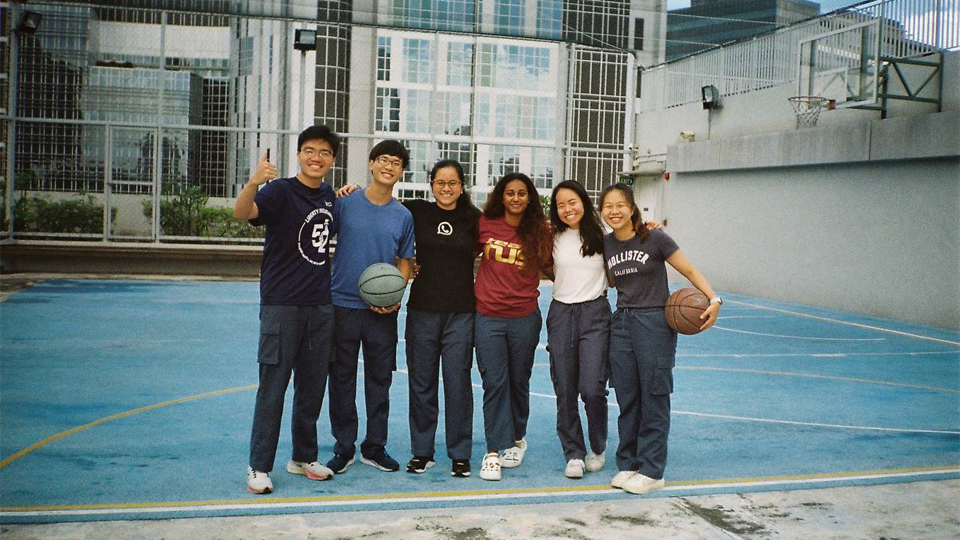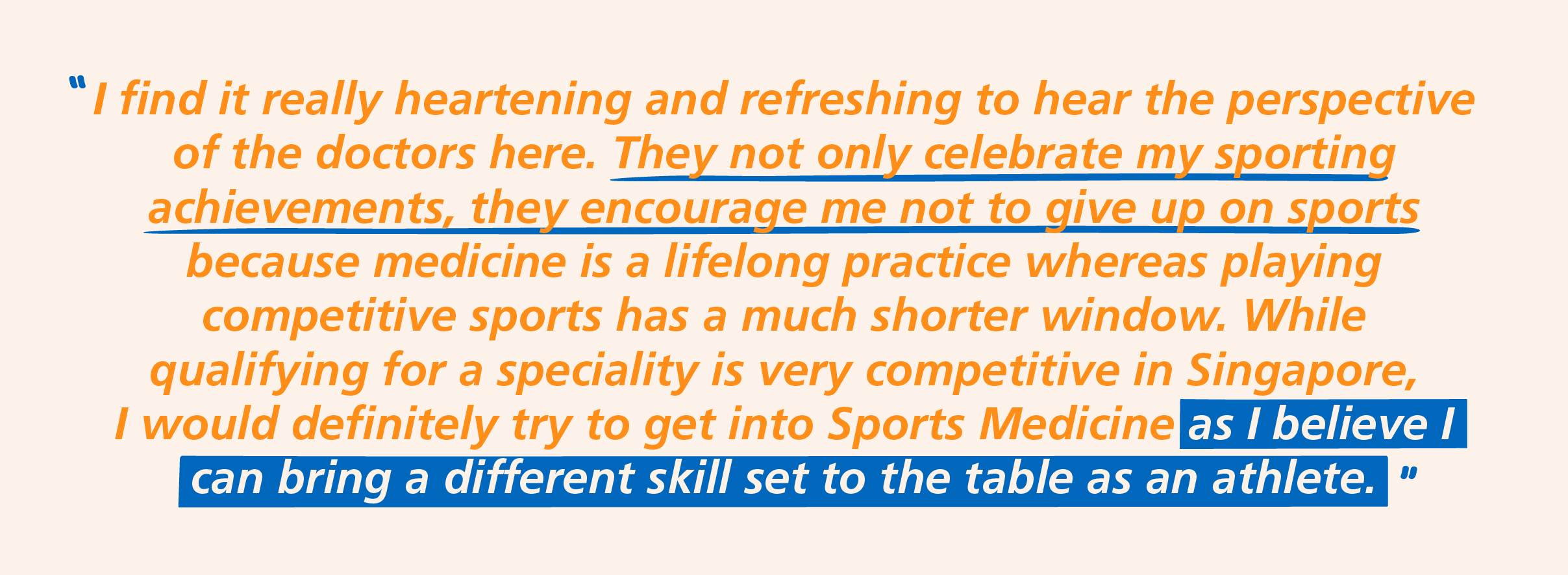Overcoming the odds
While Mounisha Devi Manivannan holds the distinction of being the first Indian goalkeeper in the national women's water polo team, not many know that the fourth-year NUS Yong Loo Lin School of Medicine student and national athlete stumbled into water polo by sheer chance.
“Back in my high school, there weren’t many sports offered to girls. There was just track and field, squash and water polo — so my friend just dragged me off to play water polo!” she shares with a smile.
To Mounisha, the two most valuable core values her athlete’s journey has taught her are perseverance and determination. These traits have marked Mounisha’s milestones in life, including making the cut for the Southeast Asian (SEA) Games on the water polo team for the first time at only 18. For a gruelling nine months before her NUS enrolment, when all her friends were wandering the globe on overseas trips, the petite 1.57m girl was training intensively for a qualifying slot.
 Mounisha with the Team Singapore women’s water polo team at the 2019 SEA Games in the Philippines.
Mounisha with the Team Singapore women’s water polo team at the 2019 SEA Games in the Philippines.


When sports meets medicine
Interestingly, it is Mounisha’s exposure to sports that first got her interested in medicine. Professing an inclination for the specialties Sports Medicine and Orthopaedics, she shares:


As her national team doctor does not travel with the athletes to competitions, Mounisha shared that they would usually only have a physiotherapist at hand. This inadvertently presented a unique opportunity for the future doctor.


Balance & breathe easy
Offering a helpful tip to students struggling to strike that balance between studies and sports, she shares: “You simply cannot have the fear of missing out. I missed the bulk of my orientation camp and had to train every day — even during dinner time. I made it a point never to compare myself with others. Needless to say, there are sacrifices to be made, including socialising, sleep and even family time.”


 Mounisha (third from right) playing basketball with her clinical group mates after their posting at Ng Teng Fong General Hospital.
Mounisha (third from right) playing basketball with her clinical group mates after their posting at Ng Teng Fong General Hospital.
2023 has been a good year for this busy student-athlete as she juggled sports and school adeptly while taking part in major competitions such as the SEA Games and the Asian Games. However, life is not all high-octane competitions and rigorous exams for Mounisha. To decompress and wind down, Mounisha likes to drop everything and binge-read. A fan of mystery novelist Keigo Hidashino, her last spree was his book Journey Under the Midnight Sun. The avid volunteer and cat lover also enjoys crocheting and knitting to relax, and is currently making a sweater.
Bridging the gap
Ever the team player, Mounisha values the culture of collaboration at NUS Medicine, which is home to both Medicine and Nursing students. She highlights that there are often organised events for both groups of undergraduates so that they have the opportunity to interact and bridge the gap.


NUS Medicine and Nursing students not only work together but play together too. Team Medicine’s basketball team, comprising students from both programmes, clinched gold in both the 2019 and 2022 Inter-Faculty Games (IFG).
 Mounisha (third from right) celebrating a win together with fellow members of Team Medicine during a basketball game in 2022.
Mounisha (third from right) celebrating a win together with fellow members of Team Medicine during a basketball game in 2022.
This solicitous culture extends to the faculty members as well. Mounisha credits her lecturers Associate Professor Tan Kong Bin and Ms Raja Indran Inthrani for being strong pillars of moral support and encouragement for her. They not only provided academic guidance but also expressed care for her general well-being and took an active interest in her sporting career.


Mounisha’s toughest ordeal at medical school came in 2021 when she unexpectedly lost three family members during the COVID-19 pandemic. As a medical student, she questioned why she did not recognise their symptoms and became critical of herself even though they had been overseas and she was not able to see them due to the pandemic. This affected her grades to the point where she had to repeat her second year. “Thankfully my sports teammates, professors and family were very supportive throughout that tough period.”
This difficult experience strengthened her ability to cope in clinical settings. She realised during this period that school was exceptionally hard because there had been a transference of emotions, and she was seeing the family members she had lost in the patients around her. Armed with this knowledge, she is now better able to sympathise with others but not get weighed down by the inevitable grief of bereavement in her clinical attachments. “In my clinical years, I have seen people pass on and I accepted it as part of the life cycle. We should fondly remember the shared memories and move on with life,” she reflects.
Shaping fitness and health
Mounisha counts the various hospital attachments she has been on as the most impactful part of her NUS Medicine experience. Having been on at least eight attachments since her third year, she has found them insightful and is ever eager to glean useful information from doctors, nurses and patients alike. Unsurprisingly, her favourite postings were those spent with the Orthopaedics department since most of the patients were athletes.


 Mounisha enjoyed her orthopaedic surgery attachments under Dr Benjamin Ang (left) at the Singapore General Hospital and Dr Mok Ying Ren (right) at the National University Hospital.
Mounisha enjoyed her orthopaedic surgery attachments under Dr Benjamin Ang (left) at the Singapore General Hospital and Dr Mok Ying Ren (right) at the National University Hospital.
On what makes a good doctor, Mounisha believes that being a team player and passion for medicine are indispensable qualities.


Citing the influence of her mother who is also an active volunteer, Mounisha enjoys helping others by organising sporting activities and advocating for a healthy lifestyle. Studying Medicine has only strengthened this sense of urgency as she began to see a lot of younger patients with chronic but preventable diseases.
Now on her last lap of her med school journey, Mounisha has started researching new methods and techniques in the area of injury prevention and rehabilitation, and looks forward to pursuing these areas in her medical career. Looking back at her undergraduate years, Mounisha reflects on how it has shaped her calling:

